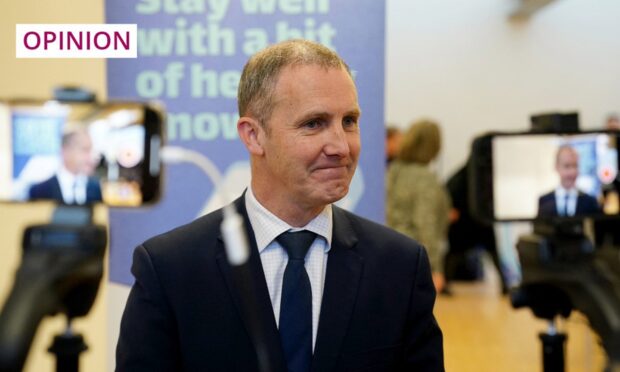Scotland’s health secretary Michael Matheson is still in post.
I repeat, Scotland’s health secretary Michael Matheson is still in post. This is despite attempting to get taxpayers to cover the cost of an £11,000 iPad bill incurred for personal use while on holiday, then leading the Scottish parliament and the media on a farcical merry-go-round of obfuscation and storyline changes as he tried to cover his tracks.
Can the public trust their health minister on anything he says now? I doubt it.
I am reminded of the resignation of Henry McLeish as first minister in 2001. That came about because he had sub-let part of a constituency office during his time at Westminster and failed to register it with the House of Commons.
And then there was Wendy Alexander, who resigned as head of Scottish Labour in 2008 after breaking rules on declaring donations to her leadership campaign, even though she had a good case for arguing she had complied with the written advice of parliamentary authorities.
It seems such high levels of propriety in public office are long gone. SNP dominance of Scottish politics has bred arrogance, which seems to have led senior party representatives to believe it is acceptable to mislead the public on important issues.
The Matheson scandal is just one reason for Scots not to have trust in their party of government. Examples of secrecy, cover-up and lack of accountability abound.
Last month marked the six-year anniversary of the “launch” of the MV Glen Sannox, one of the boats at the centre of the SNP ferries fiasco. The ship is massively over budget and is still unfinished (it famously had fake, painted-on windows at its “launch”).
We never did get to the bottom of claims that the procurement process was “rigged” for political purposes. But perhaps the most scandalous part of the whole sorry saga is that not a single person has been held accountable. It is notable that both Matheson and Humza Yousaf were ministers for transport during separate periods of this unfolding debacle. If you are going to fail, you might as well fail upwards.
And then there are the allegations of covering up evidence needed by the UK Covid inquiry, with the first minister recently being urged to accept that Scottish Government ministers could have broken the law by deleting WhatsApp messages.
Energy grievance narrative is trotted out regularly
Another attempt to mislead appears to be a concerted effort to stir up grievance around the false idea that Scots are being ripped off by the UK energy market. Earlier this year, Stephen Flynn, the SNP’s leader at Westminster, claimed in the House of Commons that “for households in Scotland energy prices have not been frozen at two and a half grand – indeed, the average bill in Scotland has been closer to £3,500”. This came following the publication of a front-page article in the Sunday Herald which stated: “Scots set to pay £1,000 more than rest of UK on energy bills.”
That was in March. Since then, the energy grievance narrative has been trotted out regularly by SNP representatives. Speaking at SNP conference in October, for example, MP Chris Law stated: “People in Scotland have higher average energy bills than those in England and Wales.”
Senior SNP members, including Flynn, have failed to correct their own records
The claims are entirely fictitious. As shown by the painstaking work of These Islands, which is engaged in an ongoing campaign to weed out misinformation in our constitutional debate, Scottish households pay no more than households in the rest of the UK for energy bills.
This reality was recognised by the Independent Press Standards Organisation last month, when it forced The Herald to publish a correction to its story – following a successful complaint by These Islands. However, senior SNP members, including Flynn, have failed to correct their own records.
Complaints have been waved away by SNP
Beware, then, Nationalist grievance relating to energy costs. Other false energy narratives promoted by the SNP include the claim that “almost 100% of our entire electricity production comes from renewables”, as Ian Blackford said in September 2022. This and similar statements were subsequently shown to be erroneous.
Then, there was the assertion, made over several years, that Scotland has 25% of Europe’s offshore wind capacity. This has also been shown to be fabricated.
And there have been credible claims that Humza Yousaf misled parliament on Scotland having “the majority of the renewables and natural resources” in the UK. This complaint was waved away by the SNP, which seems par the course now for our parliament.
As voters, this lengthy charge sheet should surely make us uneasy. We should all be asking ourselves: if they are willing to mislead and lie so often and so intently, then what else are they are misleading us on?
John Ferry is a regular commentator on Scottish politics and economics, a contributor to think tank These Islands, and finance spokesperson for the Scottish Liberal Democrats



Conversation